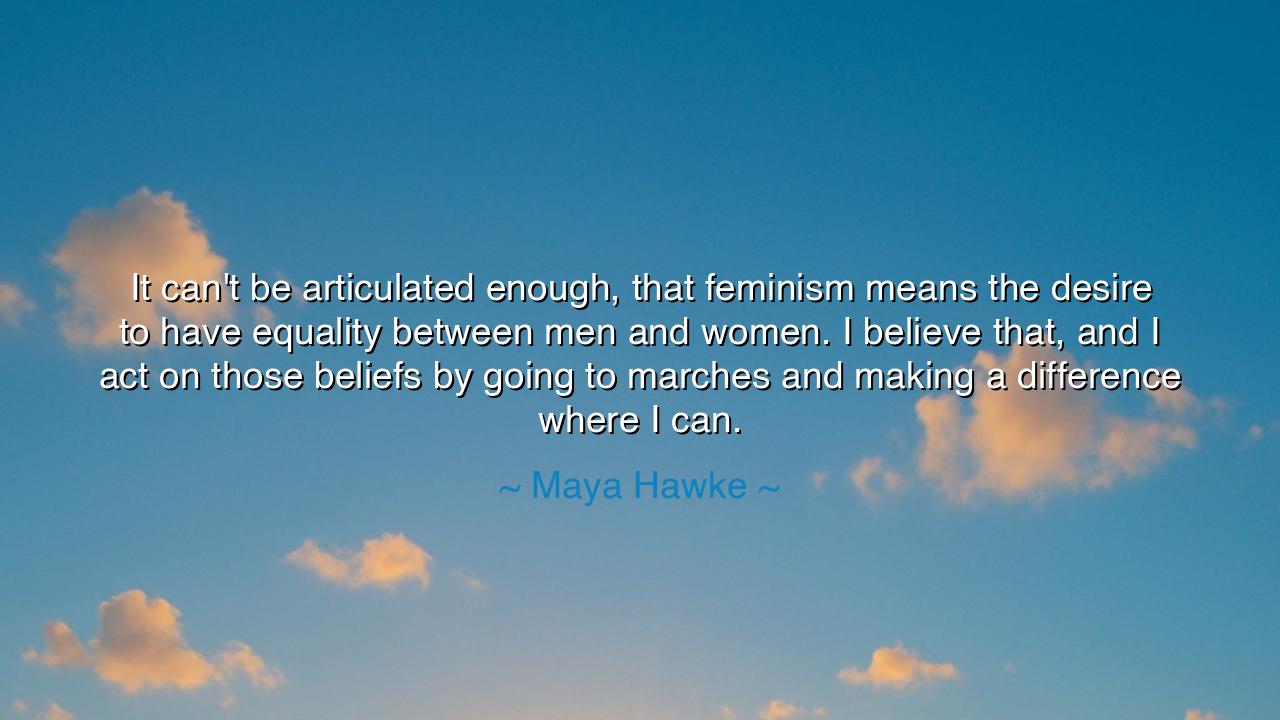
It can't be articulated enough, that feminism means the desire to
It can't be articulated enough, that feminism means the desire to have equality between men and women. I believe that, and I act on those beliefs by going to marches and making a difference where I can.






In the clear and fervent words of Maya Hawke, we hear a voice of both conviction and renewal: “It can’t be articulated enough, that feminism means the desire to have equality between men and women. I believe that, and I act on those beliefs by going to marches and making a difference where I can.” Here speaks not a philosopher in marble halls, but a living soul of the modern age—young, impassioned, and aware of the inheritance of centuries of struggle. Her words are a reaffirmation of the simplest yet most powerful truth: that feminism is not hostility, nor division, but the unshakable pursuit of equality, of justice, of balance between the masculine and the feminine forces that together shape the destiny of humankind.
To understand the meaning of this quote, one must return to the root of the word feminism—so often distorted by fear or misrepresentation. Hawke strips it of all confusion and returns it to its essence: the desire for equality. In her simplicity lies profundity. Feminism, she reminds us, is not the dominance of one over another, but the harmony of both; it is not war between genders, but reconciliation between halves of the same whole. Her insistence that “it can’t be articulated enough” speaks to the weariness of repetition—a truth repeated through generations, and yet still, in every era, misunderstood. The equality she defends is not a mere political principle—it is the balance that nature itself strives toward, the justice that civilization must constantly renew.
The origin of such a statement lies deep in the lineage of women who raised their voices long before her—voices that were silenced, mocked, or ignored, yet never extinguished. From Mary Wollstonecraft, who first wrote of women’s rights in the age of reason, to Sojourner Truth, who stood before the crowd and declared, “Ain’t I a woman?”; from Emmeline Pankhurst, who endured prison for the vote, to Malala Yousafzai, who faced bullets for the right to learn—the torch of equality has been carried across generations. Maya Hawke, though born in a freer world, recognizes that the torch must still be held high, for freedom is never final. The march must continue, not because equality has failed, but because its meaning must be defended anew in every age.
Hawke’s mention of marches is no small thing. It calls to mind the ancient tradition of collective movement—of bodies and voices united in purpose. To march is to make belief visible, to transform thought into action, and silence into song. History remembers the Women’s March of 2017, when millions around the world filled the streets, not with weapons, but with signs, laughter, and fierce resolve. It was not merely a protest—it was a reaffirmation of solidarity, a living manifestation of the truth that equality belongs to all, not only to those who demand it most loudly. When Hawke says she marches “to make a difference,” she embodies the sacred rhythm of action—the same rhythm that moved suffragettes through chains, that carried civil rights leaders across bridges, and that continues to echo in the footsteps of every soul who walks for justice.
The deeper wisdom in her words lies in the union of belief and action. “I believe that, and I act on those beliefs,” she says—an ancient formula of integrity. For belief without action is hollow, and action without belief is blind. The ancients knew this harmony: that the true measure of the soul lies not in what it professes, but in what it practices. To live one’s beliefs—to speak through deeds—is to participate in the divine rhythm of creation. In Hawke’s quiet conviction, we find this sacred alignment: thought, word, and action moving as one. Her feminism is not an abstraction; it is a living force, carried in her choices, her compassion, her willingness to stand where others have stood, and to march where others have fallen.
There is also a lesson of humility here. Hawke does not claim to lead a movement or to bear the weight of history upon her shoulders; she says simply that she “makes a difference where she can.” In that small phrase lies the greatness of ordinary courage. For not all are called to be heroes of legend, but all are capable of acts of justice, kindness, and respect. The world does not change only through laws or revolutions—it changes through the daily acts of individuals who believe that equality begins in the heart and spreads outward through conduct, conversation, and compassion.
The lesson, then, that her words offer to us is both timeless and urgent: never allow the pursuit of equality to fade into complacency. Speak of it, teach it, live it. When the world grows cynical, remind it that fairness is not a dream but a discipline; when others mock belief, answer them with action. Join the marches when you can, and when you cannot march, let your life itself become a declaration of fairness and respect.
Therefore, let Maya Hawke’s words be remembered not as a fleeting remark, but as a renewal of an ancient vow: that as long as injustice remains, the call for dignity and equality must never fall silent. Each generation must rise to articulate again what should need no reminder—that all are equal in worth and purpose. And as she teaches, let each of us act upon that truth, not in grandeur, but in steadfastness. For in every age, it is not the might of armies but the faith of those who believe in equality—and live it—that moves the world forward toward the light.






AAdministratorAdministrator
Welcome, honored guests. Please leave a comment, we will respond soon